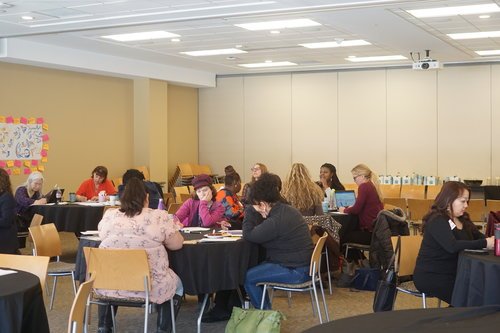CCAP DESIGN LABS
CO-CREATION FOR PROGRAM CHANGE
Project Overview
The Minnesota Department of Human Services (MN-DHS) Child Care Assistance Program (CCAP) sought to explore the question “How might we ensure the stability of care when families are experiencing housing instability?” I along with a team of others from the Futures Services Institute (FSI) at the University of Minnesota partnered with the CCAP staff on this effort. To find implementable ideas, we conducted interviews, did a deep dive into existing research on this topic, and held co-creation design labs with others also connected to the topic.
Methods: Interviews, Deep Dive, Design Labs/Co-creation Workshops, Affinity Diagramming, Journey Mapping, and Rapid Prototyping.
Deliverable: Design Lab Newsletters, and Final Report with Recommendations.
Learning - exploring and getting a sense of the landscape
We began our process in exploration. The team interviewed 38 people, looked into the policy, what had been written on the topic, and what was happening in the field. This helped us understand the landscape and prepare for the design labs.
During this time, one of my tasks was putting together a digital book (webpage) to hold all of our learnings from our deep dive and all of the information that came out of the design labs. Everyone invited to the design labs had access to the digital book. It was designed to invite in and showcase to attendees of the labs what we had learned thus far and gleaned from our design lab gatherings.
Design Labs - co-creating potential program changes
We held 3 design labs in total, 2 of which were held in the metro area (a 2 part series). and the other of which was held in Northern Minnesota.
We convened the labs to bring together diverse perspectives and collective wisdom and expertise of people connected to and affected by childcare and housing systems including families, program administrators, and childcare providers.
Throughout the design labs, we used different activities (see below) to explore different stages of the design process. This process produced a lot of insights, and 8 prototypes the CCAP team decided to explore as potential program changes. Review the design lab newsletter linked below to see a write-up of the first design lab (part 1 from the metro area lab).
Implementation - prototype review and thinking about implementation
After doing lots of research, talking to a lot of people, and hosting 3 design labs, 8 prototype ideas emerged. To assist the State CCAP team think about possible prototype implementations, our team at FSI developed prototype review worksheets.
We found that given the creative process in which the prototypes were developed, many of them didn’t appear feasible or easily implementable without lots of barriers, this particularly true factoring in the nature of bureaucratic processes often found in government agencies.
The worksheets were designed to help the CCAP Staff think about what’s possible taking into consideration the needs each prototype was designed to meet, staff capacity, and resources available.
We closed out the project by providing CCAP staff with a report encapsulating all of our work together and recommendations of 3 prototype ideas for the group to follow up on.




